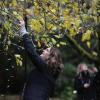January 20, 2000 - 4:00pm
The free public lecture will take place on Thursday, February 3, in room 203, building 355 (behind the library) and is sponsored by the Nanaimo RCMP and Malaspina’s criminology department.
“Many crimes cause harm to individuals, their families and the wider community,” said criminology instructor John Anderson. “In the restorative justice program, used in Britain, offenders meet victims face-to-face through the use of a facilitator. This allows offenders to hear and understand how their behaviour has affected others.”
Anderson said that the goal of the program is to provide restitution in the community. The facilitator helps reach a mutual agreement between victim and offender, and compliance of the agreement is monitored by the offender’s family or other support group.
RCMP staff sargeant Randy Munro said that referrals to the restorative justice alternative are made by the police for first-time offenders who are willing to take responsibility for their actions. Both victim and offender must agree to participate.
“In several countries, restorative justice programs have been highly effective, as measured by successfully completed agreements and whether or not the offender commits additional crimes,” said Munro.
“It’s good for us to hear how other countries deal with the issue of crime,” he added.
Tags: In the Community






